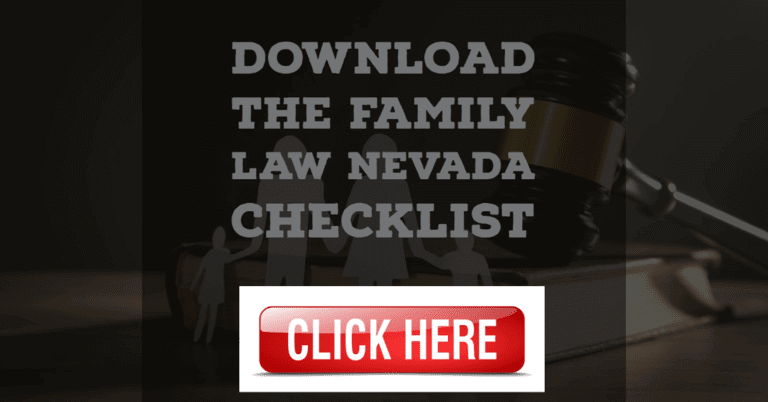When going through a Nevada divorce, you must be careful what you post on social media.
Sharing too much information can mean your posts are used as evidence against you in court and could damage your case.
Your posts can also give the wrong impression of who you are. Social media can also be used against you to show you are breaking court orders. Plus, posting about inappropriate things or activities can make it look like you would not make a good parent.
So just be extra careful when using social media during divorce proceedings.
In this post our Las Vegas divorce attorneys explain how social media can be used in court, ways to protect yourself from social media posts and we will provide answers to your most frequently asked questions. Keep reading for more information.

Don't Say Anything You Wouldn't Want to See in a Courtroom
Posts and messages from social media, text messages, emails, and other forms of digital communication can be used as evidence in court. Digital communication has become a primary source of evidence in many legal cases. This includes divorce proceedings.
In divorce, social media posts and messages can be compelling evidence. They can demonstrate a variety of things.
Many times lawyers will use social media to show infidelity. Using pictures on social media that suggest they have been unfaithful, could be used as evidence in court.
Social media can also be used to show parenting. For example, posts of substance abuse can be used to show a parent is unfit.
Another example is using social media to show one party is concealing assets or income. Pictures of expensive purchases or lavish vacations show someone is not truthful about their finances.
Lastly, social media posts can be used to prove breaches of court orders. If a court tells you not to communicate with the other party, social media posts to them can show you didn’t listen.
It’s important to note that not all posts and messages are admissible as evidence in court. For example, it may not be admissible if the evidence was obtained illegally (such as hacking into someone’s account). However, if the evidence was obtained legally and is relevant to the case, it could be used to support or refute a claim in court.
Generally, it’s best to be cautious about what you post and message during a divorce or other legal proceeding. Anything you write could potentially be used as evidence against you.
Why You Haven't Hired a Las Vegas Divorce Attorney Yet
Watch this short video to take the next big step toward getting divorced.
Social Media Can Make Going Through a Divorce Even Harder
Social media can make going through a divorce even harder for many reasons.
First, social media gives spouses a public forum to air their dirty laundry. This can create more tension between spouses. It can make the divorce process longer, more expensive and emotionally draining.
Second, seeing your ex-spouse appearing happy on social media during a divorce can be emotionally draining. It can be hard to move on and heal when these reminders constantly pop up.
Social media use has been linked to several negative impacts on mental health. This can include depression and anxiety. These effects can be particularly damaging during a divorce. Individuals are already under a lot of stress and strain and social media can make it worse.
Social media can also be a source of misinformation during a divorce. Friends or family members may share false or misleading information about the divorce or one spouse in particular. This can make your divorce more confusing and stressful.
Divorce can be challenging, and social media can make it even harder. It’s essential to recognize how social media affects your mental well-being. Take measures to avoid upsetting content while going through this process.
Keep Your Privacy Intact During Divorce—Social Media Tips & Tricks
Adjusting your social media privacy settings during a divorce can be beneficial. It protects your privacy and lets you decide who sees your posts.
You can also block your ex-spouse from contacting or seeing you. This can help avoid conflicts.
It’s also a great way to maintain a positive online presence. This can help you when looking for a new job or building a good reputation.
Lastly, it stops unwanted attention from people interested in the details of your divorce.
So, be mindful of your social media activity. Take steps to make sure it’s helpful for your divorce proceedings!
To adjust your privacy settings on Facebook, click the down arrow in the top right corner of your screen and select “Settings & Privacy.” From there, you can control who can see your posts, profile information, and contact information. You can also control who can send you friend requests and message you.
To adjust your privacy settings on Twitter, click on your profile picture and select “Settings and privacy.” From there, you can control who can see your tweets and who can send you direct messages. You can also control who can tag you in photos and other posts.

To adjust your privacy settings on Instagram, go to your profile and tap the three horizontal lines in the top right corner. From there, select “Settings” and then “Privacy.” From there, you can control who can see your posts, stories, and activity. You can also control who can tag you in photos and who can send you messages.
To adjust your privacy settings on LinkedIn, click on your profile picture and select “Settings & Privacy.” From there, you can control who can see your profile information and activity, who can send you messages, and who can see your connections.
Snapchat
To adjust your privacy settings on Snapchat, go to your profile and tap the gear icon in the top right corner. From there, select “Privacy” and then “Who Can…” to control who can see your story, contact you, and see your location.
It’s a good idea to check your social media settings regularly to make sure they’re up to date and aligned with your preferences. That way, you can stay on top of any new changes that have been made.
Get Clear on Divorce and Social Media: Answers to Common Questions
Do I Delete My Social Media Before Fling for Divorce?
Deciding whether to delete your social media accounts before filing for divorce is a personal choice.
It can be helpful if you’re worried that what you’ve posted might hurt your case, but it may raise suspicion too.
If you decide to keep your accounts, review your posts and delete any that could be used against you in court.
Consider using a social management tool like Hootsuite or Sprout Social to save time.
Review your posts and think about the context of the posts. Ask anyone who has posted something that tags or mentions you to delete it as well.
Remember that even if you delete posts, screenshots and other copies may still be around.
Finally, be mindful of what you post going forward.
Should I Post My Divorce on Social Media?
When it comes to divorce, it’s best to keep personal information on social media private. Posting details about your divorce or badmouthing your ex-spouse can actually make things more complicated for you in court.
Additionally, it’s essential to consider what kind of photos and information you post.
Posts with irresponsible behavior can be used as evidence against you. It’s best to avoid posting these kinds of things completely.
Lastly, remember that seeking support from friends and family is a much better use of your time.

Can My Ex Post Pictures of Our Kids on Social Media?
You and your ex-partner have the right to post pictures of your children on social media.
But, it’s important to do it in a responsible way. If possible, try to come to an agreement with your ex about what kinds of things are ok to post and which ones aren’t.
If you can’t agree or if you’re worried about your children’s safety, seek legal advice from a lawyer or judge.
No matter what, always keep your kids’ well-being at the forefront of your decisions.
Can Social Media Information Be Subpoenaed During Divorce?
It’s important to be aware that information from your social media accounts may be included in the divorce process.
Both parties may ask for posts, comments, photos and messages from Facebook, Twitter, Instagram and other platforms. These might help to decide things like custody or dividing property.
Not everything is allowed in court though. It’s best to check with a lawyer about what can be used or if it could have an effect on your case.
To protect yourself, try to be careful about what you post online during a divorce.
Conclusion
Divorce is complicated, and social media can have a big impact on the process.
Be mindful of what you post online. Adjust your privacy settings accordingly.
Avoid posting details or badmouthing an ex-spouse that could cause issues in court.
Taking these steps now can help ensure that your divorce is conducted fairly and respectfully.

Frequently Asked Questions
What should I do if my ex-spouse posts inappropriate photos of our kids online?
First, try to come to an agreement about what can and can’t be posted. If you can’t agree, seek legal advice from an attorney or judge. Your children’s well-being should be the priority. You may be able to request inappropriate content be removed.
Can my ex-spouse’s social media posts be used as evidence in court?
Yes, social media posts, messages, and photos can potentially be used as evidence in divorce proceedings if they are relevant to issues like custody, property division, or finances. Not everything is admissible though, so check with your lawyer about the rules in your jurisdiction.
Is it a good idea to vent about my divorce on social media?
No, it’s best not to post details or vent frustrations about your divorce online. These posts could make negotiations more difficult and may even hurt your case. Keep details private and stick to getting support from trusted friends and family offline.
Should I delete old social media posts before filing for divorce?
It’s an option, but could raise suspicion. Instead, review your posts and delete anything that could damage your case. Use a social media management tool to save time. Remember that screenshots may still exist even if you delete posts.

Glossary
Digital communication – Any communication done electronically through platforms like social media, texting, email, etc.
Divorce proceedings – The legal process of dissolving a marriage and dividing assets.
Infidelity – Cheating on your spouse, either emotionally or physically.
Parenting – Caring for and raising children as a parent.
Concealing assets – Hiding money, property, or other valuables from a spouse, often during divorce.
Court orders – Legal instructions from a judge that must be followed during divorce. Disobeying orders has consequences.
Mental health – A person’s psychological and emotional well-being. Divorce can negatively impact mental health.
Misinformation – False or inaccurate information. This is common on social media during divorces.
Subpoena – A court order requiring a person to testify as a witness or provide evidence for a case.
Custody – Legal right to care for a child. Custody is determined as part of a divorce.
Property division – The splitting of assets and debts between spouses during divorce.
Jurisdiction – The geographic area a court has authority over. Divorce laws vary by jurisdiction.

Additional Resources for You
Our esteemed lead attorney, Molly Rosenblum Allen, Esq., not only excels in her legal practice but also dedicates her time to creating valuable resources for those navigating the complexities of divorce. Her comprehensive insights and compassionate guidance are reflected in a series of informative articles available on our website. We encourage our readers to explore these resources to find support and understanding during challenging times:
Las Vegas Divorce Attorney: Offering detailed guidance through the legal landscape of divorce in Las Vegas. Read more.
How to Cope with Divorce: A profound resource providing strategies to manage the emotional journey of divorce. Explore here.
Moving On After Divorce from a Narcissist: Empowering individuals with tools to rebuild their lives after separating from a narcissistic partner. Read further.
Divorce Effects on Children’s Education: Highlighting the potential impacts of divorce on the educational journey of children. Understand more.
Introducing New Partner to Child After Divorce: Guidance on how to approach this sensitive step in the most supportive way for your child. Discover how.
Child Therapy and Divorce: Stressing the importance of professional support for children to healthily process the changes in their family dynamics. Learn the benefits.
Rebuilding Social Life After Divorce: Tips and encouragement for re-establishing a fulfilling social life post-divorce. Start rebuilding.
Signs Your Child is Struggling with Your Divorce: Recognizing the signs of distress in children and how to address them effectively. Recognize the signs.
Top Tips For Parenting Through Divorce: Practical advice for maintaining stability and nurturing for your children during this transition. Get the tips.
Managing Stress and Emotions During Divorce: Strategies to handle the emotional rollercoaster and maintain personal well-being throughout the divorce process. Manage your stress.
Molly Rosenblum Allen, Esq. is committed to providing support and clarity during the tumultuous journey of divorce, ensuring that you don’t have to navigate these waters alone. Feel free to peruse these resources at your convenience for guidance and support.

Offsite Resources You May Find Helpful
Family Law Self-Help Center – Clark County, Nevada: Provides self-help resources and information for individuals navigating family law matters, including divorce, in Clark County, Nevada.
American Psychological Association – Divorce Resources: Offers resources and articles on divorce-related topics, including the impact of social media on divorce and mental health.
DivorceMag: An online publication that covers various aspects of divorce, including articles on social media and divorce, expert advice, and resources.
Marriage.com – Divorce and Social Media: Provides articles and advice on the intersection of social media and divorce, addressing potential challenges and offering tips for managing social media during divorce.
More Frequently Asked Questions

A Special Message from Our Lead Attorney

Molly Rosenblum, Esq
Dear Reader,
Thank you very much for your time and interest in reading our resources about the potential impact of social media posts on divorce proceedings. This is an often underappreciated aspect which can significantly influence the outcome of a case, and your proactive approach to understanding it is commendable.
Each divorce case is unique, and understanding how individual elements like social media usage factor into your specific circumstances is crucial. My team and I at The Rosenblum Allen Law Firm are here to provide personalized advice, assistance, and support based on your specific situation.
I invite you to get in touch with us at (702) 433-2889. Let’s discuss your situation, explore your options, and begin creating a strategic plan tailored to your needs. We are prepared to offer the legal advice and guidance you need at every stage of the process.
Thank you again for trusting in our resources. I look forward to potentially working with you soon.
Best regards,
Molly Rosenblum, Esq.







